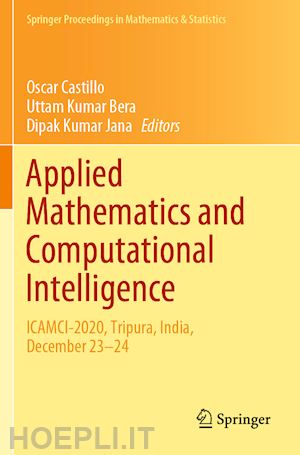

Questo prodotto usufruisce delle SPEDIZIONI GRATIS
selezionando l'opzione Corriere Veloce in fase di ordine.
Pagabile anche con Carta della cultura giovani e del merito, 18App Bonus Cultura e Carta del Docente
This book contains select papers presented at the International Conference on Applied Mathematics and Computational Intelligence (ICAMCI-2020), held at the National Institute of Technology Agartala, Tripura, India, from 19–20 March 2020. It discusses the most recent breakthroughs in intelligent techniques such as fuzzy logic, neural networks, optimization algorithms, and their application in the development of intelligent information systems by using applied mathematics. The book also explains how these systems will be used in domains such as intelligent control and robotics, pattern recognition, medical diagnosis, time series prediction, and complicated problems in optimization.
The book publishes new developments and advances in various areas of type-3 fuzzy, intuitionistic fuzzy, computational mathematics, block chain, creak analysis, supply chain, soft computing, fuzzy systems, hybrid intelligent systems, thermos-elasticity, etc. The book is targeted to researchers, scientists, professors, and students of mathematics, computer science, applied science and engineering, interested in the theory and applications of intelligent systems in real-world applications. It provides young researchers and students with new directions for their future study by exchanging fresh thoughts and finding new problems.Oscar Castillo is Professor of Computer Science at the Graduate Division, Tijuana Institute of Technology, Tijuana, Mexico. He also is serving as Research Director of Computer Science and Head of the Research Group on Hybrid Fuzzy Intelligent Systems. Presently, he is President of Hispanic American Fuzzy Systems Association (HAFSA) and Former President of International Fuzzy Systems Association (IFSA). In addition, he is also Chair of the Mexican Chapter of the Computational Intelligence Society (IEEE). He also is Member of the Technical Committee on Fuzzy Systems of IEEE and on the Task Force on “Extensions to Type-1 Fuzzy Systems”. He is also Member of NAFIPS, IFSA, and IEEE. He belongs to the Mexican Research System (SNI Level 3).
He holds D.Sc. degree (Doctor Habilitatus) in Computer Science from the Polish Academy of Sciences (on the topic, “Soft Computing and Fractal Theory for Intelligent and Manufacturing”). His research interests are in type-2 fuzzy logic, fuzzy control, neuro-fuzzy, and genetic-fuzzy hybrid approaches. He has published more than 300 journal papers, 10 authored books, 50 edited books, 300 papers in conference proceedings, and more than 300 chapters in edited books, in total more than 1000 publications (according to Scopus) with h-index of 82 and more than 23,000 citations according to Google Scholar.
He has been Guest Editor of several successful special issues in the past, like in the following journals: Applied Soft Computing, Intelligent Systems, Information Sciences, Soft Computing, Non-Linear Studies, Fuzzy Sets and Systems, JAMRIS, and Engineering Letters. He is currently Associate Editor of the Information Sciences Journal, Journal of Engineering Applications on Artificial Intelligence, International Journal of Fuzzy Systems, Journal of Complex Intelligent Systems, Granular Computing Journal, and Intelligent Systems Journal. Earlier, he was Associate Editor of Journal of Applied Soft computing and IEEE Transactions on Fuzzy Systems. He has been elected IFSA Fellow in 2015 and MICAI Fellow in 2016. Finally, he recently received the recognition as Highly Cited Researcher in 2017 and 2018 by Clarivate Analytics and the Web of Science.
Uttam Kumar Bera is Associate Professor at the Department of Mathematics, National Institute of Technology Agartala, Tripura, India. He did his M.Sc. and Ph.D. from Vidyasagar University, West Bengal, India, in the year of 2001 and 2008, respectively. He has been teaching mathematics both at undergraduate and postgraduate students. His specialization is in operations research.
Beside the regular teaching and research activity, he is Associate Dean in-charge; Chairman of DPC, SW section; Coordinator of the DST-FIST project and the DST-STUTI projects, etc. He is Senior Member of the IEEE society, Life Member of the Operational Research Society of India, Indian; Calcutta Mathematical Society, Kolkata; and IAPQR. He has published more than 90 papers in journals of repute like the IEEE Transaction of Fuzzy System, IEEE Transaction on Engineering Management, IEEE Accesses, Applied Soft Computing, Computers and Industrial Engineering, Computer in Industry, Neural Computing and Applications, APM, CAMWA, IJCSM, JOS, IJOR, IJAOM, ICJA, OPESARCH, and JTRS. Presently, five students are pursuing Ph.D. under him. He has received six research projects in the capacity of PI/Co-PI from different funding agency like DST, NBHM, CSIR, and UGC-NPIU and completed successfully. Recently, he received a DST-STUTI project of 75 Lakhs of duration 3 years. He is on the editorial board of two international journals. He has successfully guided eight research scholars in this field of inventory control, transportation problem, and disaster management. He has awarded DST-international travel grand and conference grad from DST in the year of 2019.
Dipak Kumar Jana is Professor and Head of the Department, School of Applied Science and Humanities, Haldia Institute of Technology, Haldia, West Bengal, India. He did his Ph.D. from the Indian Institute of Engineering Science and Technology, Shibpur, Kolkata, West Bengal, India, and his M.Sc. in applied mathematics with specialization in operations research from Vidyasagar University, West Bengal. A qualified National Eligibility Test (NET-CSIR) for Junior Research Fellow (JRF) and GATE, he has been teaching mathematics to both undergraduate and postgraduate students. He is Member of Operational Research Society of India, Indian Science Congress Association, and Calcutta Mathematical Society.











Il sito utilizza cookie ed altri strumenti di tracciamento che raccolgono informazioni dal dispositivo dell’utente. Oltre ai cookie tecnici ed analitici aggregati, strettamente necessari per il funzionamento di questo sito web, previo consenso dell’utente possono essere installati cookie di profilazione e marketing e cookie dei social media. Cliccando su “Accetto tutti i cookie” saranno attivate tutte le categorie di cookie. Per accettare solo deterninate categorie di cookie, cliccare invece su “Impostazioni cookie”. Chiudendo il banner o continuando a navigare saranno installati solo cookie tecnici. Per maggiori dettagli, consultare la Cookie Policy.